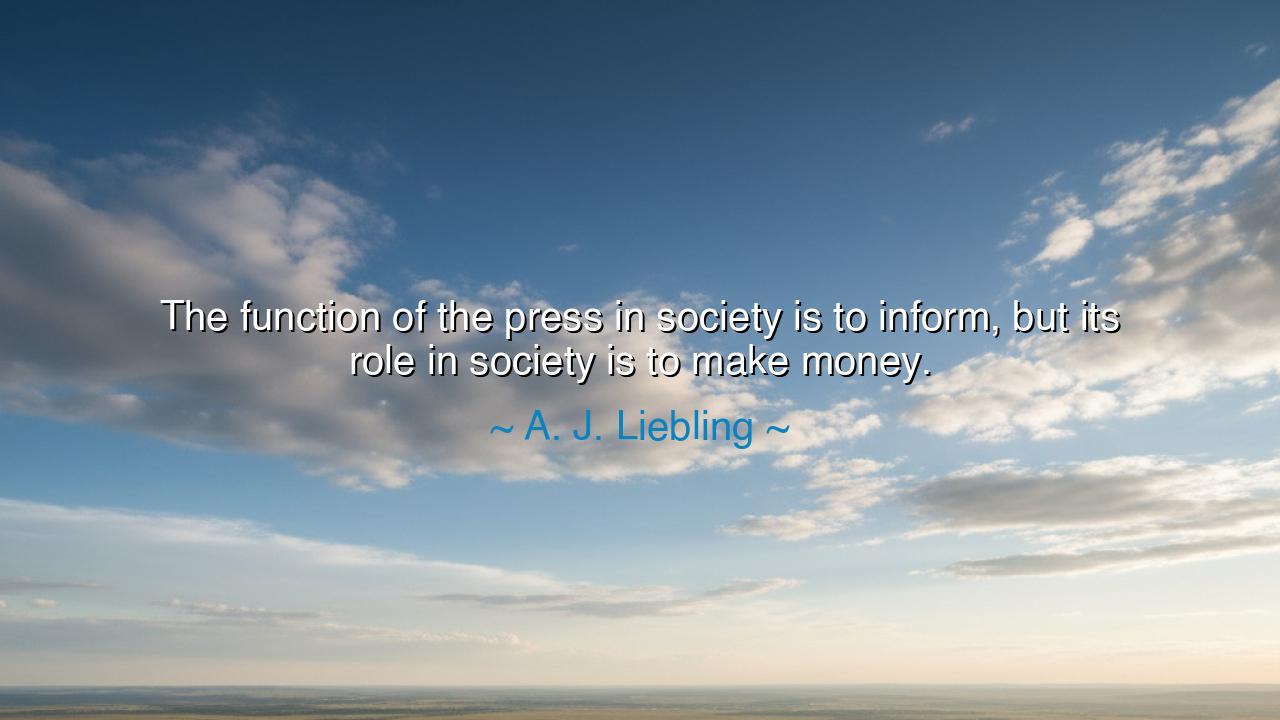
The function of the press in society is to inform, but its role
The function of the press in society is to inform, but its role in society is to make money.






In the grand sweep of history, the role of the press has been one of immense significance. It is through the written word, the spoken voice, and the shared news of the world that societies have been shaped, knowledge has been passed down, and lives have been changed. And yet, as the great A. J. Liebling so candidly stated, "The function of the press in society is to inform, but its role in society is to make money." These words, though simple, carry a profound weight, reminding us of the dual nature of the press: it serves both a noble purpose and a pragmatic one. The press is a force that can enlighten, but it is also an institution that must survive and thrive, and therein lies the tension that shapes its very existence.
The press is tasked with the sacred duty of informing the public. It is the vessel through which truth flows into the hearts and minds of the people, carrying the stories of the world, the events that shape nations, and the knowledge that allows individuals to make informed decisions. From the ancient scrolls that recorded the wisdom of the Sumerians to the printing press that birthed the Renaissance, the written word has long been the soul of civilization. It was the press that spoke truth to power, that unveiled the dark secrets of empires, that challenged the status quo and demanded accountability from rulers. In this sense, the function of the press is sacred: it is a tool for empowerment, for the spread of justice, and for the preservation of freedom.
Yet, as Liebling wisely observed, the role of the press in society is often far more complicated. While the press’s function is to inform, it is also a business—an entity that exists within the larger economic system. The press must sell its words, its stories, and its time to an audience that is not always interested in truth, but in entertainment, sensationalism, and the drama of the human condition. It is this dual function that creates a tension in the media: the press must balance its duty to inform with its need to profit. A newspaper must draw readers, sell advertisements, and maintain financial health—and in doing so, it often finds itself sacrificing the noble pursuit of truth for the immediate rewards of profit and popularity.
Consider, for instance, the rise of yellow journalism in the late 19th century, when newspapers like William Randolph Hearst’s New York Journal and Joseph Pulitzer’s New York World sought to capture public attention with exaggerated and sensationalized stories. The press in this era was focused not on the truth, but on selling newspapers. In the process, it played a role in stirring public emotions, pushing the United States toward war with Spain in 1898. The press, in its pursuit of profit, became a powerful force for manipulation—using sensationalism to attract attention, even at the cost of truth and responsibility. The function of the press—to inform—was compromised by its role—to make money.
This tension between the noble and the pragmatic is not a modern creation; it has existed for centuries. The public sphere has always been shaped by the complex interaction between the media’s duty to inform and its need to survive in an economic system. In the early 20th century, radio and later television transformed the landscape of news. These new mediums introduced both the promise of greater access to information and the reality of the commercialization of that information. The media, regardless of its form, has always been caught between its role as a public service and its need to generate profit.
The lesson, then, is clear: while the press has a sacred duty to inform, we must also be aware of its role in a profit-driven society. We, as consumers of news, must demand not just the sensational, but the truth. We must hold the press to the highest standard, demanding that it seek integrity above profit, and that it prioritize the well-being of society over the pursuit of clicks and shares. The press must serve the public, but we, as citizens, must also serve the press by being discerning, by rejecting sensationalism, and by seeking the truth, no matter how uncomfortable it may be.
Let us, then, understand the complex nature of the press in our time. While it is a tool for information, it is also a business that must survive. We must approach the press with both wisdom and caution, recognizing the duality of its function and role. In doing so, we become better stewards of the information that shapes our world, ensuring that the press, in all its forms, fulfills its noble duty to inform while being held accountable for the ways in which it navigates the profit-driven realities of the modern world. Let us all be vigilant in our pursuit of truth, demanding that the press rise above the temptation to serve only the bottom line and instead work to serve the greater good of society.






AAdministratorAdministrator
Welcome, honored guests. Please leave a comment, we will respond soon